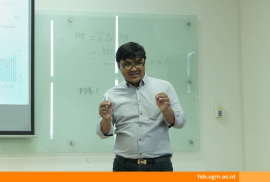Faculty of Economics and Business University of Gadjah Mada (FEB UGM) celebrate 64th Anniversary with the spirit of improvement of quality of education after successfully maintaining Association’s accreditation to Advance Collegiate Schools of Business (AACSB) International. Carrying theme “Unite and Strengthening Quality”, a series of events celebrating the Anniversary opened with an economic seminar titled “Economic Outlook and Key Policy Challenges in Emerging Asia”, Friday (6/21). This event in collaboration with Kensuke Tanaka, Head of the Asia Desk for the Organization for Economic Co-operation and Development (OECD) Development Center as a speaker. Also attend Sekar Utami Setiastuti, Ph. D., Person in Charge of Macroeconomic Dashboard, Department of Economics, UGM as the discussant of the discussion on this morning. The event was moderated by Gunawan, B.Sc., M.Sc., one of the lecturers of the Department of Economics, UGM.
The event started with explanation about Economic Outlook for Southeast Asia, China, and India: Smart Urban Transportation and Digitalization by Tanaka. Tanaka explaining the growth of Gross Domestic Product (GDP) in developing countries in Southeast Asia, China, and India, despite external and domestic barriers. Economic prospects of countries, especially in Southeast Asia, China and India 2019, and various challenges towards Smart Urban Transportation.
In Southeast Asia, the rate of economic expansion has remained superior even though it looks declining. Current gross export growth has survived quite well from uncertainty in trade policy. Projection in the near and medium-term will also benefit developing countries in Asia. However, if you want to maintain strong growth, Tanaka assesses additional policies are needed, including maximizing opportunities and reducing risks from financial technology, strengthening export performance amid increasing protectionist policies, and reducing risks from natural disasters.
Tanaka emphasized that fintech is currently not only mobile payments but also can potentially affect economic growth in a country. Digitalization in the field of commerce (e-commerce) is also predicted to grow rapidly in the Asian arena. In terms of infrastructure, Tanaka added that assessing the feasibility of infrastructure development that had been carried out through the Net Present Benefit (NPB) is not a correct method. The contribution to increasing income and also taxes on the regions is considered more important than NPB. Therefore, the government is deemed necessary to change the concept of infrastructure.
The second session was continued by Sekar which discussed the implications of the OECD Report in detail about the development of transportation and digitalization in Indonesia. Sekar assesses that infrastructure development which is continuously encouraged by the government will be worthless if it is not utilized by the community. Therefore, education is considered very crucial in attracting public awareness so that the program promoted by the government will be effective, not just a waste of government budget. This will have implications for increasing productivity in the economy.
Indonesia is predicted to grow by 5.3% from 2019 to 2023. The roaring trade war between China and the United States is considered to have an impact on the economy but is limited to the short term. Current Account Deficit (CAD), which has a current leak, is influenced by oil and gas, which contributes negatively to Indonesia’s trade balance. The key takes away what can be done by making adjustments to oil and gas policies.
Chrisentianus, Dean of the Faculty of Economics Immanuel Christian University Yogyakarta was very interested in the issues discussed because transportation and digitalization were considered to have new powers in the Asia Pacific and China. “We come here because we want to see Indonesia’s current position especially with projects that are encouraged by the government, such as infrastructure, digital economy, fintech, one of them. At least we have an idea of Indonesia’s position, especially in Southeast Asia”.
Source: Leila Chanifah Zuhri and Sony Budiarso




